Navy SEAL’s Book Disputes Official Account Of Bin Laden’s Death
A new book by one of the Navy SEALs involved in the raid that killed Osama bin Laden differs significantly from the official version put forward by the government.
A soon to be released book by a member of the Navy SEAL team involved in the raid that resulted in the death of Osama bin Laden disputes the official account that has been provided by the government in several material respects:
A firsthand account of the Navy SEAL raid that killed Osama bin Laden contradicts previous accounts by administration officials, raising questions as to whether the terror mastermind presented a clear threat when SEALs first fired upon him.
Bin Laden apparently was hit in the head when he looked out of his bedroom door into the top-floor hallway of his compound as SEALs rushed up a narrow stairwell in his direction, according to former Navy SEAL Matt Bissonnette, writing under the pseudonym Mark Owen in “No Easy Day.” The book is to be published next week by Penguin Group (USA)’s Dutton imprint.
Bissonnette says he was directly behind a “point man” going up the stairs in the pitch black hallway. “Less than five steps” from top of the stairs, he heard “suppressed” gunfire: “BOP. BOP.” The point man had seen a “man peeking out of the door” on the right side of the hallway.
The author writes that bin Laden ducked back into his bedroom and the SEALs followed, only to find the terrorist crumpled on the floor in a pool of blood with a hole visible on the right side of his head and two women wailing over his body.
Bissonnette says the point man pulled the two women out of the way and shoved them into a corner and he and the other SEALs trained their guns’ laser sites on bin Laden’s still-twitching body, shooting him several times until he lay motionless. The SEALs later found two weapons stored by the doorway, untouched, the author said.
In the account related by administration officials after the raid in Pakistan, the SEALs shot bin Laden only after he ducked back into the bedroom because they assumed he might be reaching for a weapon.
White House spokesman Tommy Vietor would not comment on the apparent contradiction late Tuesday. But he said in an email, “As President Obama said on the night that justice was brought to Osama bin Laden, ‘We give thanks for the men who carried out this operation, for they exemplify the professionalism, patriotism and unparalleled courage of those who serve our country.'”
(…)
The account is sure to again raise questions as to whether the raid was intended to capture or simply to kill bin Laden. Bissonette writes that during a pre-raid briefing, a lawyer from “either” the White House or Defense Department told them that they were not on an assassination mission. According to Bissonnette, the lawyer said that if bin Laden was “naked with his hands up,” they should not “engage” him. If bin Laden did not pose a threat, they should “detain him.”
Elsewhere in the book, Bissonnette, who some media outlets are still only referring to by the pseudonym he chose for the book, Matt Owen, expands on the comments about the President:
Though he praises the president for green-lighting the risky assault, Owen says the SEALS joked that Obama would take credit for their success. On his second night in Afghanistan waiting for final orders, sitting around a fire pit and joking about which Hollywood actors would play them in the bin Laden movie, one SEAL joked, “And we’ll get Obama reelected for sure. I can see him now, talking about how he killed bin Laden,” according to Owen.
Owen writes: “We had seen it before when he took credit for the Captain Phillips rescue. Although we applauded the decision-making in this case, there was no doubt in anybody’s mind that he would take all the political credit for this too.”
Later, while watching Obama’s speech announcing the raid, Owen writes: “None of us were huge fans of Obama. We respected him as the commander in chief of the military and for giving us the green light on the mission.” When one SEAL jokes again that they got Obama reelected, Owen asks, “Well, would you rather not have done this?”
He writes: “We all knew the deal. We were tools in the toolbox, and when things go well they promote it. They inflate their roles. But we should have done it. It was the right call to make. Regardless of the politics that would come along with it, the end result was what we all wanted.”
Later, when they meet Obama at the White House, Owen says he was reluctant to sign the American flag presented to the president because it would disclose his identity. So, at least one SEAL scribbled a random name on the flag. While going through the metal detector to meet the president, Owen’s pocketknife set off the alarm.
After listening to Obama’s speech and enduring Biden’s “lame jokes that no one got (He seemed like a nice guy, but he reminded me of someone’s drunken uncle at Christmas dinner)” the president invited the team to return to his residence later for a beer.
But Owen writes a few weeks later: “We never got the call to have a beer at the White House.” Joking with a fellow SEAL, “Hey, did you ever hear anything about that beer?” Walt cracks: ” You believed that shit. I bet you voted for change too, sucker.”
The political comments are interesting, but in the end rather unimportant. While soldiers are generally forbidden from speaking out politically while in uniform, there’s not really much of anything that regulations can do about private conversations among comrades, and it’s not even clear that conversations such as this would be impermissible. It’s also not entirely surprising that members of the military would be politically unimpressed with a Democratic President. Nonetheless, the comments will no doubt be at least somewhat embarrassing for the Obama Administration.
The real news here, of course, is the fact that Bissonnette’s rendition of the tale of the bin Laden raid differs in several important respects from the official version that the government has put forward. Just days after the raid, the White House stated that, while bin Laden was not armed at the time he was killed, he was resisting capture. Other versions of the narrative have stated that bin Laden was making a move back into his room to retrieve a weapon and the SEALs followed him and shot him in the room. Then, in August of 2011, Nicholas Schmidle described the events in the house this way in a long essay in The New Yorker:
The Americans hurried toward the bedroom door. The first SEAL pushed it open. Two of bin Laden’s wives had placed themselves in front of him. Amal al-Fatah, bin Laden’s fifth wife, was screaming in Arabic. She motioned as if she were going to charge; the SEAL lowered his sights and shot her once, in the calf. Fearing that one or both women were wearing suicide jackets, he stepped forward, wrapped them in a bear hug, and drove them aside. He would almost certainly have been killed had they blown themselves up, but by blanketing them he would have absorbed some of the blast and potentially saved the twoSEALs behind him. In the end, neither woman was wearing an explosive vest.
A second SEAL stepped into the room and trained the infrared laser of his M4 on bin Laden’s chest. The Al Qaeda chief, who was wearing a tan shalwar kameez and a prayer cap on his head, froze; he was unarmed. “There was never any question of detaining or capturing him—it wasn’t a split-second decision. No one wanted detainees,” the special-operations officer told me. (The Administration maintains that had bin Laden immediately surrendered he could have been taken alive.) Nine years, seven months, and twenty days after September 11th, an American was a trigger pull from ending bin Laden’s life. The first round, a 5.56-mm. bullet, struck bin Laden in the chest. As he fell backward, the SEAL fired a second round into his head, just above his left eye. On his radio, he reported, “For God and country—Geronimo, Geronimo, Geronimo.” After a pause, he added, “Geronimo E.K.I.A.”—“enemy killed in action.”
This is significantly difference from the story that Bissonnette tells in his book, of course. In that version of the story of the raid, bin Laden had already been injured, quite severely apparently, before going back into the bedroom and was then shot as he laid bleeding on the ground, a condition in which he was obviously unable to offer resistance. This account also differs from the contentions made by members of bin Laden’s family after the raid that the al Qaeda leader was captured alive and then executed on the ground floor of the Abbottobad compound. Kevin Jon Heller contends that, under Bossinette’s version of events, the killing of bin Laden was, technically, a war crime:
A member of an organized armed group engaged in a non-international armed conflict (like a government soldier involved in an international armed conflict) can be targeted with lethal force at any time, subject to the exception stated in Art. 41(1) of the First Additional Protocol: “A person who is recognized or who, in the circumstances, should be recognized to be hors de combat shall not be made the object of attack.” A combatant is hors de combat in three situations: (1) “he is in the power of an adverse Party” (ie., captured); (2) “he clearly expresses an intention to surrender”; or (3) “he has been rendered unconscious or is otherwise incapacitated by wounds or sickness, and therefore is incapable of defending himself.”
(…)
By the author’s own admission, bin Laden was wounded but not yet dead when he and his fellow SEAL “fired several rounds” into his chest. He and his fellow SEAL thus intentionally killed bin Laden while he was ”otherwise incapacitated by wounds” and hors de combat. That was a war crime — the war crime of wilful killing.
I imagine some readers will respond by pointing out that bin Laden was already fatally wounded when the SEALs shot him. There are two problems with that response. To begin with, the author is not a doctor; bin Laden may not have actually been fatally wounded. More importantly, though, it makes no difference if he was dying — he was still alive when the author and his fellow SEAL shot him, and that is all the war crime of wilful killing requires. That is not a controversial idea; no domestic criminal-law system would consider shooting a person dying of a fatal heart attack to be anything but murder. If your actions deprive someone of even one second of life, you are both the factual and legal cause of their death.
There is no chance, of course, that the two SEALs will ever be prosecuted for killing bin Laden. But that doesn’t mean, assuming the author’s account is accurate, that what they did was legal. It wasn’t — it was a war crime, pure and simple.
That’s a contention that’s no doubt going to arose some outrage from Americans who see bin Laden, quite correctly, as the man who spent the better part of a decade plotting attacks against America and Americans, and who green-lighted and financed the terrorist attack that resulted in the death of 3,000 Americans on September 11, 2001. Indeed, in The Telegraph, Con Coughlin notes that even if it is true that bin Laden was killed in cold blood, nobody is going to care:
If true, this account of bin Laden’s final moments contradicts the official White House version, which claimed bin Laden was shot because the Seals thought he was searching for a weapon. And it certainly blows a hole in the original White House claim that the Abbottabad raid was a “kill or capture” mission, which left open the possibility that the world’s most wanted terrorist could have been taken into custody and made to stand trial for his many crimes.
There will, of course, be those among the prosperous global human rights fraternity who will be argue that bin Laden was, in effect, killed unlawfully, and that all those, from the Navy Seals involved in the operation up to President Barack Obama himself, in his capacity as America’s commander-in-chief, should face prosecution for their involvement in what amounts to an extra-judicial killing.
Well, if that’s their attitude, bring it on! Given bin Laden’s well-documented involvement in acts of terrorism, they are going to have a tough time trying to find anyone to take their claim seriously.
Bin Laden made no secret of the fact that he was waging war against the West, and as a man who personally sanctioned the mass murder of thousands of innocent people around the world, the Seal team were well within their rights not to put their own lives at risk so that bin Laden could be taken alive.
That strikes me as largely correct. Even if the bin Laden raid was a “kill or capture” mission, the idea that actually capturing bin Laden was ever a realistic possibility seems hard to believe. Under the circumstances even has recounted in the book, these SEALs were in a darkened, unsecured house that may still be hiding other members of bin Laden’s family or members of al Qaeda that posed a threat to the SEAL team. The idea that they would have been able to safely get bin Laden out of there alive and into a helicopter strikes me as just a bit of Monday Morning Quaterbacking on the part of many.
However, the differences between this account and the official story told by the White House are disturbing because, if Bissonnette is telling the truth, then the official version has been sanitized significantly and details have been added that may not be true at all. The account of what happened in the bedroom is only one discrepancy between the two accounts. The official account speaks of a firefight in the compound that lasted upwards of 40 minutes, for example, but Bissonnette’s book states that they team faced no resistance outside the home and that no shots were fired until they actually entered the building. It’s possible, of course, that Bissonnette is the one who’s being inaccurate here, and I suppose that’s a question that readers of his book will have to decide for themselves. As it stands, though, there is a discrepancy here, an one has to wonder which one is true.
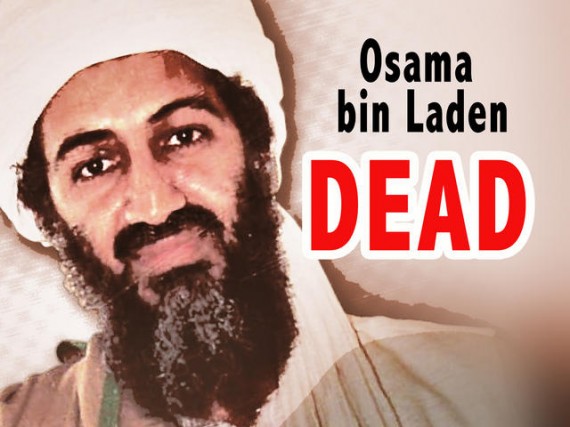

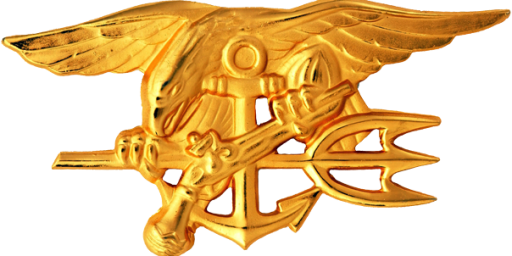
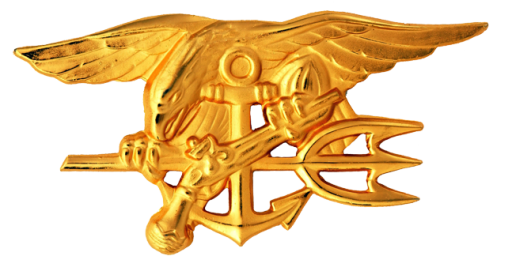
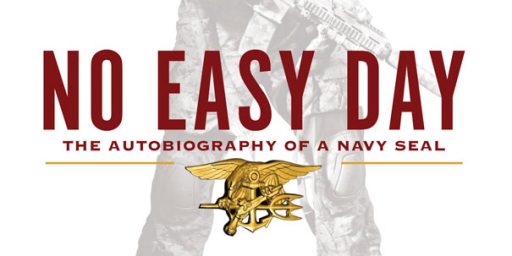
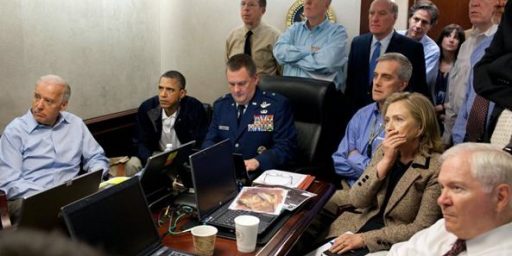
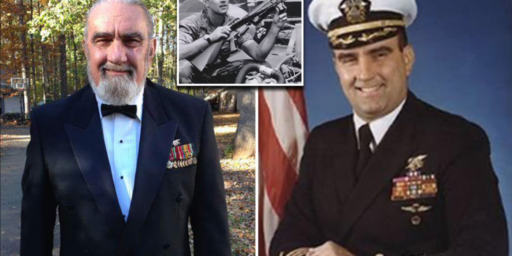
It doesn’t make sense to me, because a head peaking around a corner seems like more of a threat, not less, in a firefight. What’s the idea, that the story was “badly sanitized?”
More likely it’s a game of telephone.
The basic point here is to present one view of the details in order to make Obama look bad.
We’ll see how this plays.
Meh. Ultimately the goal of any book about this operation is to sell more books. The most important thing is that bin Laden sleeps with the fishes. Whether he was shot while resisting or executed in cold blood is a non-issue and is of no consequence.
Swift Bin Ladening ?
I am shocked, SHOCKED, that the US Govt’ would sanitize the details of an operation in a sovereign country we were not at war with, and what is more I am HORRIFIED by the idea that they would make stuff up. I mean, they’ve never done anything like that before!
Sometimes Doug….
On the more serious side…
I would like to ask Bissonnette and his comrades, just exactly who the F they think should get the political credit for the success of the raid? Obama took the political risks of ordering it, and if it had failed would have taken the political blame for it….
I would really like to know their thinking on this.
So your saying that the official account of a military operation differs from the first person accounts of the people who were actually there? That makes it like every military operation in history. Every one. Spend some time reading official histories and first person accounts of any operation. Historians spend careers trying to tease out the truth.
I just glad the SOB is dead, I dont care how they got him. This country waited too damn long for bin laden to be killed and I will never forgive the Bushies for telling us it was too hard to find him and not important enough to try. Bull Shit. They would rather chase phantom WMD’s in the Iraqi desert than hunt down the man behind the murder of 3000 Americans. History will not be kind in its judgement of those fools.
I just scanned the article and didn’t see it, but does anyone know if author’s account explains how the wife got shot in the leg if there was no real firefight upstairs, with her in the middle?
This is a very unfortunate book. Mr. Bisonnette makes himself look foolish and his team look immature in their political ramblings. He has violated the long-established no-comment rule of the SEALS. In the process has done damage to the SEALS and to US national security in order to cash in and make a buck. A sad piece of work.
Agree with Michael — it’s a shame that character is evidently not part of the SEAL selection process. I respected them more before they became electoral partisans.
Re: the double-tap (triple-tap?), I take Heller’s point, but I am not immediately persuaded that a soldier on the battlefield has to seek medical advice before administering what in better times might’ve been regarded as a merciful death blow. Frankly, I doubt there’s much international law interpreting that situation.
(I also dunno why he cites Protocol I, not ratified by the U.S., and not Common Article 3, which we did ratify — I left him a question at his blog.)
Um, how does the government have an official version of events? From what the sailors on the ground told them. So this is more of a case of one sailor contradicting the account of the other sailors.
Owen is either dense or disingenuous, and he’s definitely tiresome. The key words there are “political credit”. Of course a president – any f***ing president – is going to take “political credit” for a successful operation that he authorized.
I’d like to ask Owen a simple question: If the mission that Obama ordered had failed, would he (Owen) have preferred that the president blame the SEAL Team? The SEAL Team received accolades from the president, and now, in typical conservative fashion, this gets spun as Obama slighting the SEAL Team. Owen is nearly as sleazy as the Swift Boat Greaseballs.
But should they care? This country’s increasingly blase attitude towards barbarism as long as it’s directed at foreignors ought to be more distrubing. Even if you’re an ammoral lump who doesn’t care about the rights of anyone who’s not like you, this should concern you for practical reasons. Eventually that attitude is going to be turned inward, and given a lot of the stories of police brutality we’ve been seeing lately, that may already be happening.
That’s just completely untrue. It’s the opposite of the truth. In the 1940’s we were burning entire cities full of civilans to the ground. In the 1950’s and 1960’s we proposed as a matter of core American strategy to exterminate every living thing in the USSR and its allies in the event of a war. Now we’re questioning our moral right to shoot an acknowledged terrorist mastermind and mass murderer, and this is a descent into barbarism? The United States has done some barbarism — ask the Indians, ask the Filipinos, the Germans, the Japanese, but shooting this assh*le was not barbaric.
@Anderson:
One small correction, because I see this a lot: SEALS are not soldiers. They are in the Navy, and thus properly referred to as sailors (whether officers or enlisted men). “Soldiers” only refers to those in the Army. (Similarly, Marine Corps personnel are not soldiers either).
“Con Coughlin notes that even if it is true that bin Laden was killed in cold blood, nobody is going to care”
I am extremely liberal, don’t support the death penalty in any instance and I don’t care. There is not a single location on the planet where it would have been safe to stash bin Laden. Everyone within a 10 mile radius would have been at risk. I don’t give a whip about vengeance but I couldn’t live with the thought of another person dying because of this man. Sleep well with the fishes.
@Stormy Dragon:
I’m generally in agreement with you, but Reynolds’ rebuttal has merit, IMO. Though I’d add that the threat level faced matters a great deal and, thus, firebombing cities in WWII is not necessarily the response of a more barbaric nation than our post-9/11 actions are, because the Axis powers >>>>>> Al Quaeda. Also applicable to the Cold War.
To sum up: I fall between you. I deplore the blaise attitude toward bombing (or otherwise killing) people, and note the militarization of police with alarm. But I hold out hope that this is actually against the long-term trend, which is actually positive.
@OzarkHillbilly:
And what do they think W would have done in the circumstances?
I had no problem with shooting Bin Laden down. In my opinion, he was wanted dead or alive, and “dead” worked just fine. He started it, and we finished it.
We have done this sort of thing before, most notably with Admiral Yamamoto in WW2 – and he was someone I regard as an honorable enemy. Regrettable, but we live in a violent world, and that is not likely to change any time soon.
Sorry, I just think of “sailors” as the little guy on the Cracker Jack box.
@Anderson:
Sailors often used to be better hand to hand fighters than soldiers. On a battlefield, you could always run away. On a ship…not so much.
@Rafer Janders:
A small correction Rafer, some SEALs are Marines.
@gVOR08:
Uhhh, fly onto an aircraft carrier wearing a cod-piece and a banner that says “Mission Accomplished?”
Oh, and by the way, I have alluded to my “war hero Uncle who would have smiled and turned away without saying a word”…
My Uncle Alex was a frog-man during WWII (a SEAL before there were SEALs) was involved in several amphibious operations, one of which got him written up in a teenage book called “Frogmen of WWII” in which he was extolled to have engaged in several heroic acts.
Did he? Probably. I am quite sure those acts paled in comparison to the ones that were unrecorded. I would not know. He never said a guddamned thing about any of it.. And he never would have said a guddamned word about any of this either.
The thing I remember about my Uncle Alex? His smile. He always had a smile.